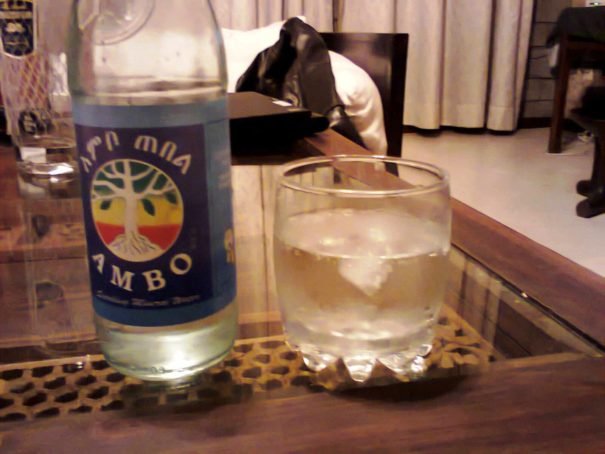
A Very Thorough Sampling of Ethiopia’s Booze Offerings

A Very Thorough Sampling of Ethiopia’s Booze Offerings
Gin-Ambo in Addis Ababa
Macchiatos were not the only drink I would discover in Ethiopia when I lived there. There were moments which called for something stronger.
The sporting rivalry between Kenya—my home country—and Ethiopia is the stuff of legend. I remember in particular the women’s 10,000 meters at the 2012 London Olympics. The two Kenyan contenders, Sally Kipyego and Vivian Cheruiyot, were under pressure to deliver medals for the Kenyan team, whose performance had been lackluster. Cheruiyot proclaimed rather prematurely to the press that “Kenya will have its first gold today.” But it was Tirunesh Dibaba, also known as the Baby-Faced Destroyer, who won, giving Ethiopia its first gold. This victory dented my wallet and bruised my ego significantly. It was in moments like this, nursing a broken heart, that I turned to my favorite drink: gin-Ambo.
I believe that the exploration of a new—or in this case, a very old—country is not complete without a sampling of its alcoholic beverages. I imbibed endless decanters of tej honey wine, sipped the homemade brews araki, katikala and tella, guzzled the sweet red Axumit at the Sheraton Addis, shared crates of Bedele beer on Ethiopian New Year, made concoctions with the mysteriously green Supermint from Safeway supermarket, margaritas at Liquid Lounge, discovered tea corretto (tea laced with ouzo) at la Parisienne Café at Bole Olympia. My due diligence would not have been complete without St. George, the holy beer which I first drank on the terrace of the Taitu Hotel in Piassa. My favorite discovery, however, turned out to be gin-Ambo—simply gin, mixed with Ambo, a brand of naturally carbonated mineral water.
“Ambo is good for your digestion,” a colleague told me about the stuff that would become my favorite mixer. Ambo’s website explains that the water comes from thermal mineral springs in the Ethiopian Highlands. It also claims that as the “leading beverage” of Ethiopia, it is a true “Ethiopian Icon.”
This story would be incomplete if I didn’t mention the greatest of all Ethiopian icons: Abebe Bikila, the first African to win an Olympic gold medal. And he did it barefoot. The story goes that Bikila was added to the Ethiopian Olympic team only at the last moment as a replacement for Wami Biratu, who had broken his ankle in a soccer match. Adidas, the shoe sponsor at the 1960 Summer Olympics, had so few shoes left when Bikila went to try some on, he ended up with a pair that didn’t fit comfortably. So Bikila decided to run barefoot, the way he’d trained. When asked why, he said: “I wanted the whole world to know that my country, Ethiopia, has always won with determination and heroism.” And to that, I raise my glass.